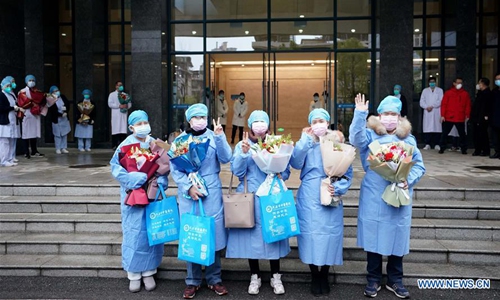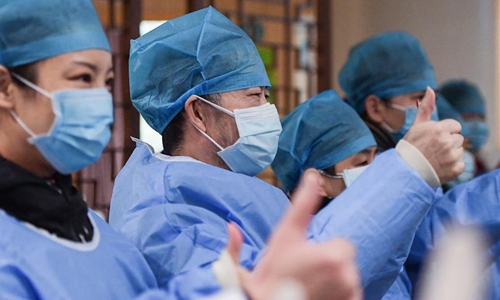HOME >> CHINA,SPECIAL-COVERAGE
Virus can’t stop China’s march forward
By Yang Sheng Source:Global Times Published: 2020/2/7 20:03:43 Last Updated: 2020/2/7 23:33:40
Nation has crisis awareness, capable of self-correction: experts

Cured novel coronavirus pneumonia patients are discharged from a hospital in Wuhan, central China's Hubei Province, Feb. 6, 2020. A total of 23 novel coronavirus pneumonia patients were cured and discharged from hospital on Thursday after integrated treatment with traditional Chinese medicine (TCM) and Western medicine. (Xinhua/Wang Yuguo)
The novel coronavirus outbreak won't stop China from marching forward, as the country's system shows its unique advantages, has strong crisis awareness and is able to fix problems immediately, Chinese experts said.
They were reacting to some in the West who said the crisis will be a "black swan" which would curb China's rise.
This comes as the Chinese Lantern Festival arrives on Saturday about two weeks since the national awareness of the outbreak.
The festival is an important traditional Chinese festival for family reunions, but to reduce the chance of infection, most Chinese people can only celebrate it separately at home. The incubation period of the virus is 14 days, and some observers believe that the campaign against the 2019-nCov epidemic is moving into "the second half." What China has done in "the first half" has laid a significant foundation for the next step, they said.
Since the start of the battle against the virus, China has shown unique advantages in handling the huge crisis, such as blockading the outbreak region of tens of millions of people, building high-tech and large capacity hospitals in a very short time, pooling resources to research on a vaccine and sharing the information with the rest of the world.
The country's advanced internet also allowed hundreds of millions of people to conduct all-weather supervision over every move and release from the government while the government also can immediately respond to concerns to adjust its measures.
For instance, on Friday, the National Supervisory Commission sent an inspection team to Wuhan, capital city of Hubei Province and the epicenter of the novel coronavirus outbreak, to thoroughly investigate issues related to doctor Li Wenliang, after criticism filled the internet over the Wuhan government's misconduct of Li's case.
Li, one of the eight "whistleblowers" who tried to warn others of the coronavirus outbreak but were reprimanded by local police, died from the virus on Thursday night.
The decision of the supervisory body was approved by the Communist Party of China Central Committee, the commission said in a statement on its website Friday.
Zhang Weiwei, director of the China Institute of Fudan University in Shanghai, told the Global Times on Friday that while the people are angry about what is happening in Hubei, they can also fairly judge the government's performance in other provinces, and local governments like Henan, Sichuan and Shanghai all received positive evaluations from the people, so it's like a healthy competition among different regions to test their governance capability.
The experience of China is worth learning from, Tedros Adhanom Ghebreyesus, director-general of the World Health Organization, said on January 29 while visiting China, adding that he believes the measures China has taken will effectively control and finally prevail over the epidemic.

Cured novel coronavirus pneumonia patients cheer for themselves in a hospital in Wuhan, central China's Hubei Province, Feb. 6, 2020. A total of 23 novel coronavirus pneumonia patients were cured and discharged from hospital on Thursday after integrated treatment with traditional Chinese medicine (TCM) and Western medicine. (Xinhua/Li He)
Superiority complexHowever, while the Chinese people are making great efforts to fight the virus, some in the West have made unfriendly and rude comments on China. An article titled "China is the Real Sick Man of Asia" by a US scholar published in the Wall Street Journal on Monday has seriously offended Chinese people.
Shen Yi, director of the Research Center for Cyberspace Governance of Fudan University, said that "the sick man of Asia" will remind Chinese people of the term "the sick man of East Asia" which is a terrible and racist insult in Western colonization history over China and a painful and humiliating memory.
"These words written by a US scholar and published in the Wall Street Journal show that some Westerners still hold a superiority complex toward us," he noted.
The first line of the article read "The mighty Chinese juggernaut has been humbled this week, apparently by a species-hopping bat virus."
Shen said, "Look at the words. They sound like: Finally, although we can't stop China, thank god, the virus is doing the job for us. That's what they want to see, even though the crisis kills so many people."
Zhang said China is not a "sick man" at all, as "the Chinese system has once again shown its great strength in rendering an efficient and sweeping response to an emergency of this proportion, and it's simply doing so much better than the US compared to the US handling of the 2009 H1N1 epidemic and the 2005 Katrina catastrophe."
Strong resilience The Wall Street Journal article made a pessimistic prediction of China's economic and financial situation.
Zhang said "The Chinese economy will suffer a bit, just a bit, and it will catch up fast in the remaining time of the year, and China's rise is unlikely to be derailed at all."
It is likely to provide new impetus to China's rise especially in the new technological revolution ranging from 5G, AI to big data as over 200 million people are working from their homes via Clouds, he noted.
"The Chinese philosophy always treats crises as both dangers and opportunities, just as following the SARS outbreak in 2003 came Alibaba's Taobao revolution and medical insurance for all Chinese nationals. After this crisis, China will move further up in the value and tech chain of the 4th Industrial Revolution and consolidate its public health system," Zhang said.
Chinese President Xi Jinping spoke over phone with US President Donald Trump on Friday morning, and said that "China has carried out national mobilization, across-the-board deployment and swift responses, adopted the most comprehensive and rigorous prevention and control measures, and launched a people's war against the epidemic."
Noting that China's efforts are gradually yielding positive results, Xi stressed that China has full confidence and capability to prevail over the epidemic and that the trend of the Chinese economy maintaining long-term growth will not change, the Xinhua News Agency reported.
US President Donald Trump said the US has confidence in China's economic growth, adding that Washington will calmly look at and respond to the epidemic, and is willing to maintain communication and cooperation with China through bilateral and WHO channels.
The impact of the novel coronavirus outbreak will be temporary and limited. With the strong resilience of the economy, China's government has ample policies to stabilize economic growth, said Pan Gongsheng, vice governor of the People's Bank of China, at a press conference on Friday.
"China will guide financial institutions to enhance credit aid for regions and industries affected by the novel coronavirus. Changes will involve lowering loan costs and increasing medium and long-term loans to help them overcome this difficult phase," the official noted.